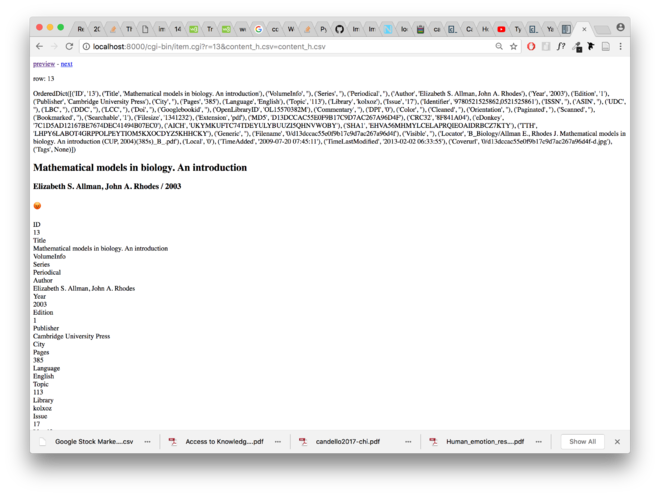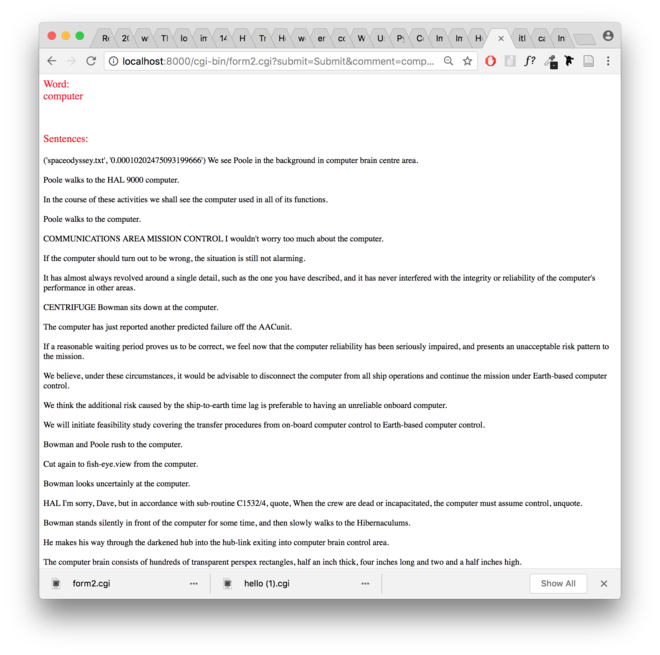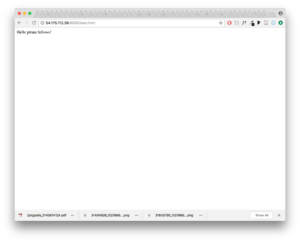Interfacing the law prototyping Zalan Szakacs
CGI & TF-IDF search engine – Michael
Pad of the lesson: prototyping-17042018
CGI (the other one) Common Gateway Interface > from early days of the web, introducing the idea of browsing, the query, running software dynamically online https://docs.python.org/2/library/cgi.html
perl-- early programming language, web editing, design https://www.perl.org/
https://www.amazon.com/Games-Diversions-Perl-Culture-Journal/dp/0596003129 error_in_time https://vimeo.com/228916519 (poem-programming) 'More than one way to do it!' - Larry Wall, creator of Perl
you can run perl scripts: perl mystery.pl
Comma separated catalogue – Andre + Michael
Pad of the lesson: CSV-libgen
CSV:
- comma-separated values
- plain-text file
- commas are used as field seperators
- A record ends at a line terminator (such as new line \n)
- All records have to have the same number of fields
How to handle it? Tools for handling CSV
- head - output the first part of files
- tail - output the last part of files
- CSVKit - "swiss army knife" of CSV files. Install: sudo pip3 install csvkit
Documentation: https://csvkit.readthedocs.io/en/1.0.1/#
- Python CSV core lib https://docs.python.org/3.5/library/csv.html
- structured-text-tools https://github.com/dbohdan/structured-text-tools
What is it? How is it structure? What data does it contain? Is it incomplete or messy?
- Headers are in seperate file libgen_columns.txt, we might need to integrate it into content.csv, as python CSV library takes the first row of a CSV file as the headers row
- convert libgen_columns.txt to CSV:
A alternative: cat libgen_columns.txt | sed "s/\ \ \`/\"/g" | sed "s/\`.*/\",/g"| tr --delete '\n'
MAC: cat libgen_columns.txt | sed "s/\ \ \`/\"/g" | sed "s/\`.*/\",/g" | tr -d '\n'
converting txt to csv (MAC): libgen_columns.txt | sed "s/\ \ \`/\"/g" | sed "s/\`.*/\",/g" | tr -d '\n' > headers.csv
Workshop 1 Building our own search engine – Dusan Barok (monoskop)
#!//usr/local/bin/python3
import cgi
import cgitb; cgitb.enable()
import nltk
import re
print ("Content-type:text/html;charset=utf-8")
print ()
#cgi.print_environ()
f = cgi.FieldStorage()
submit1 = f.getvalue("submit1", "")
submit2 = f.getvalue("submit2", "")
text = f.getvalue("text", "")
### SORTING
import os
import csv
import string
import pandas as pd
import sys
### SEARCHING
#input keyword you want to search
keyword = text
print ("""<!DOCTYPE html>
<html>
<head>
<title>Search</title>
<meta charset="utf-8">
</head>
<body>
<p style='font-size: 20pt; font-family: Courier'>Search by keyword</p>
<form method="get">
<textarea name="text" style="background: yellow; font-size: 10pt; width: 370px; height: 28px;" autofocus></textarea>
<input type="submit" name="submit" value="Search" style='font-size: 9pt; height: 32px; vertical-align:top;'>
</form>
<p style='font-size: 9pt; font-family: Courier'>
webring <br>
<a href="http://145.24.204.185:8000/form.html">joca</a>
<a href="http://145.24.198.145:8000/form.html">alice</a>
<a href="http://145.24.246.69:8000/form.html">michael</a>
<a href="http://145.24.165.175:8000/form.html">ange</a>
<a href="http://145.24.254.39:8000/form.html">zalan</a>
</p>
</body>
</html>""")
x = 0
if text :
#read csv, and split on "," the line
csv_file = csv.reader(open('tfidf.csv', "r"), delimiter=",")
col_names = next(csv_file)
#loop through csv list
for row in csv_file:
#if current rows value is equal to input, print that row
if keyword == row[0] :
tfidf_list = list(zip(col_names, row))
del tfidf_list[0]
sorted_by_second = sorted(tfidf_list, key=lambda x:float(x[1]), reverse=True)
print ("<p></p>")
print ("--------------------------------------------------------------------------------------")
print ("<p style='font-size: 20pt; font-family: Courier'>Results</p>")
for item in sorted_by_second:
x = x+1
print ("--------------------------------------------------------------------------------------")
print ("<br></br>")
print(x, item)
n = item[0]
f = open("cgi-bin/texts/{}".format(n), "r")
sents = nltk.sent_tokenize(f.read())
for sentence in sents:
if re.search(r'\b({})\b'.format(text), sentence):
print ("<br></br>")
print(sentence)
f.close()
print ("<br></br>")
Workshop 2 Tunneling – Marcel Mars (memory of the world)
Pad of the day Marcell Mars workshop
mapping locations with firewall location/exclusive spaces: physical border range of wi-fi mapping the network: network switch boxes, ethernet cables, router https://en.wikipedia.org/wiki/Router_(computing)
AP - access point eduroam- authorization https://en.wikipedia.org/wiki/Eduroam
works everywhere in eduroam environment the password matches in the same building- metadata tells you when the information comes from--the university guarantee to the central institution
what they will know from a website:
domain name subdomain
https: https://en.wikipedia.org/wiki/HTTPS secure connection certificate (we were paying before)
https://letsencrypt.org/ https://en.wikipedia.org/wiki/Let's_Encrypt so not to use https for every site mozilla was behind that--
notary
https://www.digicert.com/ wildcard/ the first word is hidden:
*.wikipedia.org
notary will charge you for wildcard/ now they are free https://en.wikipedia.org/wiki/Wildcard_character
ex: somebody stills the certificate of the server of wikipedia and then impersonates wikipedia
jessica and logan use the part after the slash in the browser
DNS servers root servers
https://www.lifewire.com/what-is-a-dns-server-2625854
Automatic (DHCP): automatic IP address systemd-resolve --status for ubuntu cat /etc/resolv.conf
1.1.1.1 DNS
https://blog.cloudflare.com/announcing-1111/
cat /etc/hosts
ip a
link/ether (with barcode)
https://en.wikipedia.org/wiki/International_Mobile_Equipment_Identity
macchanger in linux--> you change to another decive and they dont know your megadress
http://sci-hub.hk/ ping sci-hub.hk <is the server alive> copy the 80.82.77.83 in the /etc/host
127.0.0.1 facebook.com <you block facebook, telling your computer to go to localhost instead>
Network interface - part of the computer that talks to the internet an ip address is assigned to the network interface on your computer (wireless, cable)
discussion on current discourse on security, politics:
Amazon Web Services "more dangerous than google" !
https://aws.amazon.com/?nc2=h_lg cloud computing (set up for domains)
Even Apple is on Amazon servers: https://techcrunch.com/2018/02/27/apple-now-relies-on-google-cloud-platform-and-amazon-s3-for-icloud-data/
Letter: In solidarity with Library Genesis and Sci-Hub inviting other 'custodians' into civil obedience http://custodians.online





